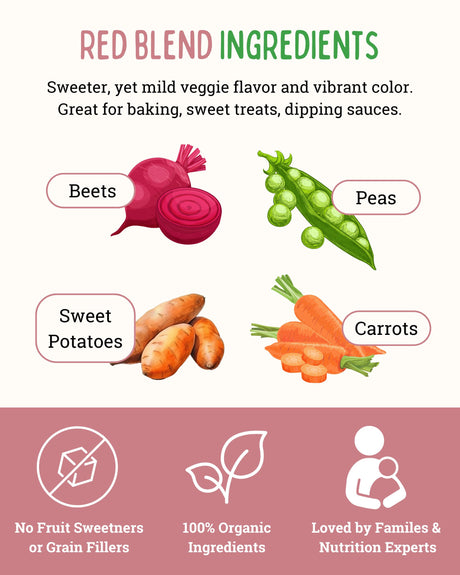Welcome to a journey of discovery, where we explore the critical role that vitamins play in the wondrous world of child development. In this blog, we'll delve into the importance of these tiny powerhouses and how they are the unsung heroes behind your child's growth, cognition, and overall health.
Essential Building Blocks for Growth
Vitamins serve as the foundational blocks for your child's growth, providing the necessary elements for the development of strong bones, sturdy muscles, and a healthy immune system. As your child ventures through the different stages of growth, these vitamins are the driving force behind their physical development, ensuring they reach their potential in height and strength.
Nurturing Cognitive Development
Beyond physical growth, vitamins are instrumental in nurturing cognitive development. They act as cognitive fuel, supporting the brain's growth and function. We'll explore how specific vitamins aid memory, concentration, and problem-solving skills, helping your child thrive academically and intellectually.
Safeguarding Overall Health
While we often associate vitamins with growth and cognition, they play a pivotal role in safeguarding your child's overall health. From bolstering the immune system to promoting healthy skin, vitamins are the guardians of well-being in children. We'll delve into the different vitamins that contribute to a robust immune system and overall vitality.
Understanding Essential Vitamins

Vitamin A
The Vision Vitamin: Vitamin A is renowned for its role in maintaining healthy eyesight. It aids in low-light vision and supports the development of tissues throughout the body. You can find vitamin A in foods like sweet potatoes, carrots, and leafy greens.
Vitamin C
The Immune Booster: Vitamin C is a superhero when it comes to boosting the immune system. It also helps in the absorption of iron from plant-based foods. Citrus fruits, strawberries, and bell peppers are excellent sources of vitamin C.
Vitamin D
The Bone Builder: Vitamin D is crucial for strong bones and teeth, as it assists in the absorption of calcium and phosphorus. It's often called the "sunshine vitamin" because our bodies can produce it when exposed to sunlight. Dietary sources include fatty fish like salmon and fortified dairy products.
Vitamin E
The Antioxidant Protector: Vitamin E acts as a powerful antioxidant, defending cells against damage. It's essential for healthy skin and eyes. Nuts, seeds, and vegetable oils are rich in vitamin E.
B-Vitamins
The Energy Providers: The B-vitamins, including B1, B2, B3, B5, B6, B7, B9, and B12, play a crucial role in converting food into energy, supporting metabolism, and promoting healthy brain function. Sources of B-vitamins range from whole grains to lean meats and leafy greens.
Vitamins for Physical Growth

Nurturing Physical Development
Vitamins are like building blocks for your child's physical growth. They participate in various processes that enable your child to reach important milestones, from infancy to adolescence.
The Foundation of Bone Health
Healthy bones are the foundation of physical growth, and vitamins have a significant impact here. Vitamin D, for instance, aids in the absorption of calcium and phosphorus, which are essential for bone strength.
Without enough vitamin D, children may be at risk of developing weak bones, known as rickets.
Fueling Muscle Growth
Muscles are critical for physical development, and certain vitamins help fuel their growth and maintenance. The B-vitamins, such as B6 and B12, play a role in protein metabolism and muscle function.
Ensuring your child gets these vitamins through a balanced diet supports their muscle development.
The Importance of Vitamin A
Vitamin A contributes to the growth of various tissues in the body, including skin and soft tissues. It's particularly vital for eye health, and a deficiency can lead to vision problems. By incorporating vitamin
A-rich foods like carrots and sweet potatoes into your child's diet, you support their overall growth and well-being.
Cognitive Development and Vitamins

Nurturing Memory and Learning
Vitamins have a profound impact on cognitive functions, including memory, attention, and learning. Vitamin B6, for example, is known to influence neurotransmitters in the brain, which are vital for memory and cognitive processes.
Ensuring your child gets enough B-vitamins can help support their cognitive development.
Building Blocks for Brain Development
Brain development in children is a dynamic process, and vitamins are the building blocks that support this growth. Omega-3 fatty acids, found in fish and flaxseed, are essential for brain health.
They contain docosahexaenoic acid (DHA), which is crucial for the growth and functioning of brain cells. Additionally, folate (a B-vitamin) plays a role in DNA synthesis and repair, which is fundamental for brain development during pregnancy.
Vitamin C and Cognitive Benefits
Vitamin C is well-known for its immune-boosting properties, but it also contributes to cognitive health. This vitamin acts as an antioxidant, protecting brain cells from damage and supporting cognitive function.
Including vitamin C-rich foods like citrus fruits and berries in your child's diet can help bolster their cognitive development.
Vitamin E and Cognitive Aging
Vitamin E, an antioxidant, may have long-term benefits for cognitive health. Some research suggests that it may help slow down cognitive decline associated with aging.
While this is more relevant for adults, it underscores the importance of a lifelong focus on vitamins and their role in cognitive well-being.
Immune System Support
Essential for a Robust Immune System
Vitamins are the superheroes behind a strong and resilient immune system in children. Vitamin C, often touted for its immune-boosting properties, promotes the production and function of white blood cells, which are vital for fighting off infections.
Additionally, vitamin D plays a significant role in regulating the immune response, making it a key player in maintaining overall immune health.
Shielding Children from Common Illnesses
Vitamins act as a protective shield against common childhood illnesses. For example, vitamin A is crucial for maintaining the health of mucosal surfaces in the respiratory and digestive tracts, which are common entry points for infections.
Ensuring your child gets enough vitamin A through a well-balanced diet can help reduce their susceptibility to respiratory and gastrointestinal infections.
Nutritional Gaps and Supplements
Common Nutritional Gaps
Despite parents' best efforts, children's diets may still have nutritional gaps. Busy schedules, picky eating habits, and limited food choices can lead to deficiencies in essential vitamins.
For instance, vitamin D, which is primarily obtained through sunlight and fortified foods, can be lacking in children who spend more time indoors or in regions with limited sun exposure.
Likewise, vitamin B12, found mainly in animal products, might be insufficient in vegetarian or vegan diets unless intentional dietary choices are made to include fortified foods or supplements.
Iron deficiency is another concern, especially among toddlers and young children who may not consume adequate iron-rich foods.
The Potential Need for Vitamin Supplements
While a balanced diet should be the primary source of essential vitamins, there are cases where vitamin supplements can fill nutritional gaps. Pediatricians may recommend supplements for children at risk of deficiencies, such as those with dietary restrictions, certain medical conditions, or limited sun exposure.
Vitamin D supplements, for example, are commonly advised for children living in regions with little sunlight during certain seasons. Likewise, vitamin B12 supplements may be necessary for children following vegetarian or vegan diets.
Iron supplements might be recommended for those with diagnosed iron-deficiency anemia.
Healthy Eating Habits

Promoting a Balanced Diet Rich in Essential Vitamins
Promoting a balanced diet is crucial for providing children with a wide array of essential vitamins. Encourage a diet that includes fruits, vegetables, whole grains, lean proteins, and dairy or dairy alternatives. Each food group offers a unique set of vitamins necessary for growth and development.
Parents can lead by example by making nutritious food choices themselves. When children see adults enjoying a variety of healthy foods, they are more likely to adopt these habits. Additionally, involving children in meal planning and preparation can pique their interest in nutritious foods and increase their willingness to try new things.
Encouraging Children to Eat a Variety of Vitamin-Rich Foods
Variety is key when it comes to children's diets. Different foods provide different vitamins, so encouraging children to eat a diverse range of foods is essential. Make mealtime an opportunity to explore new flavors and textures. Experiment with various fruits, vegetables, grains, and proteins to keep meals exciting and vitamin-packed.
Offering a "rainbow plate" can be a fun way to engage children in eating a variety of colorful foods. Challenge them to fill their plates with foods of different colors, explaining that each color represents different vitamins and nutrients. This simple game can make healthy eating more enjoyable for kids.
Risks of Vitamin Deficiency
Potential Consequences of Vitamin Deficiencies in Children
Vitamin deficiencies in children can lead to various health issues. For example, vitamin D deficiency can affect bone health and may lead to conditions like rickets, which weakens bones and causes deformities.
Inadequate vitamin C intake can result in scurvy, characterized by fatigue, bleeding gums, and skin problems.
Recognizing Signs of Vitamin Deficiency and Seeking Medical Advice
It's essential for parents to be aware of signs indicating possible vitamin deficiencies in their children. These signs may include fatigue, slow growth or developmental delays, recurring infections, skin problems, and mood changes.
If any of these signs are observed, it's crucial to consult a healthcare professional promptly. Medical advice can help identify specific deficiencies through testing and guide parents on dietary adjustments or supplements when needed. Early intervention is key to addressing deficiencies and preventing potential health complications.
Key Takeaways About the Role of Vitamins in Child Development
The Significance of a Balanced Diet and Healthy Eating Habits
In summary, the foundation for promoting optimal child development lies in providing a balanced diet rich in essential vitamins. Encouraging healthy eating habits, such as incorporating a variety of nutrient-dense foods, ensures children receive the necessary vitamins.
The combination of proper nutrition, regular check-ups, and a supportive environment sets the stage for a child's healthy growth and overall well-being.
Leave your comments below; we love to hear from you! And don't forget to follow EasyPeasie for more veggie info and convo on YouTube, Facebook, and Instagram! ~ThePeas













